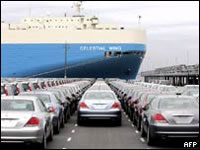Japan's trade surplus has slumped far faster than expected, as demand for Japanese goods from China subsided and the cost of oil hit home.
At 297bn yen ($2.7bn; £1.5bn), it was down 68.3% in May from a year earlier.
The decline - the fourth in five months - could have worrying implications for the Japanese economy, traditionally heavily dependent on exports.
But although less was shipped to China, Japan continued to expand its exports to the US.
The subdued export picture, which reinforces recent current account data, means Japan is now relying more on domestic demand than has been the case in the past, economists said.
"The trade balance already hit a peak last year," said Nikko Citigroup's Kiichi Murashima.
"The big picture is that private consumption and investment are supporting growth in Japan."
Energy pressures
China and the US are by far the most significant overseas markets for Japanese goods.
Between them they account for more than a third of all exports with China, experiencing an investment-led boom, rapidly growing in importance in recent years.
But the government in Beijing has for the past year been trying to take its economy off the boil.
That, economists said, was hitting demand for machinery and raw materials, while another factor could be anti-Japan protests earlier this year, triggered by a textbook which Chinese activists said refused to acknowledge atrocities committed by Japanese troops during World War II.
At the same time, energy costs have started to hurt Japan, which has no indigenous hydrocarbon reserves.
Crude oil prices are stuck above $50 a barrel and are now approaching $60 - driving the value of Japan's imports up 18.6% from the previous year.




 By: N. Peter Kramer
By: N. Peter Kramer
